ACCG925: Audit Firm Rotation, Independence, and Alternative Solutions
VerifiedAdded on 2023/06/14
|7
|1430
|109
Essay
AI Summary
This essay critically examines the concept of audit firm rotation as proposed by the PCAOB to enhance auditor independence. It discusses the key changes, motivations, and potential impacts of mandatory audit firm rotation on auditor independence, audit quality, and audit skepticism. The essay also explores alternative solutions to audit firm rotation, such as mandatory retendering of audit procedures and joint audits, while considering the drawbacks and limitations of each approach. Ultimately, the analysis questions whether audit firm rotation truly achieves its aim of fostering auditor independence in mind, rather than merely in appearance, and highlights the potential unintended consequences of such policies, including increased reliance on non-audit services from other firms. The essay concludes by emphasizing the importance of ethical conduct among auditors and the need for a balanced approach to regulatory interventions.
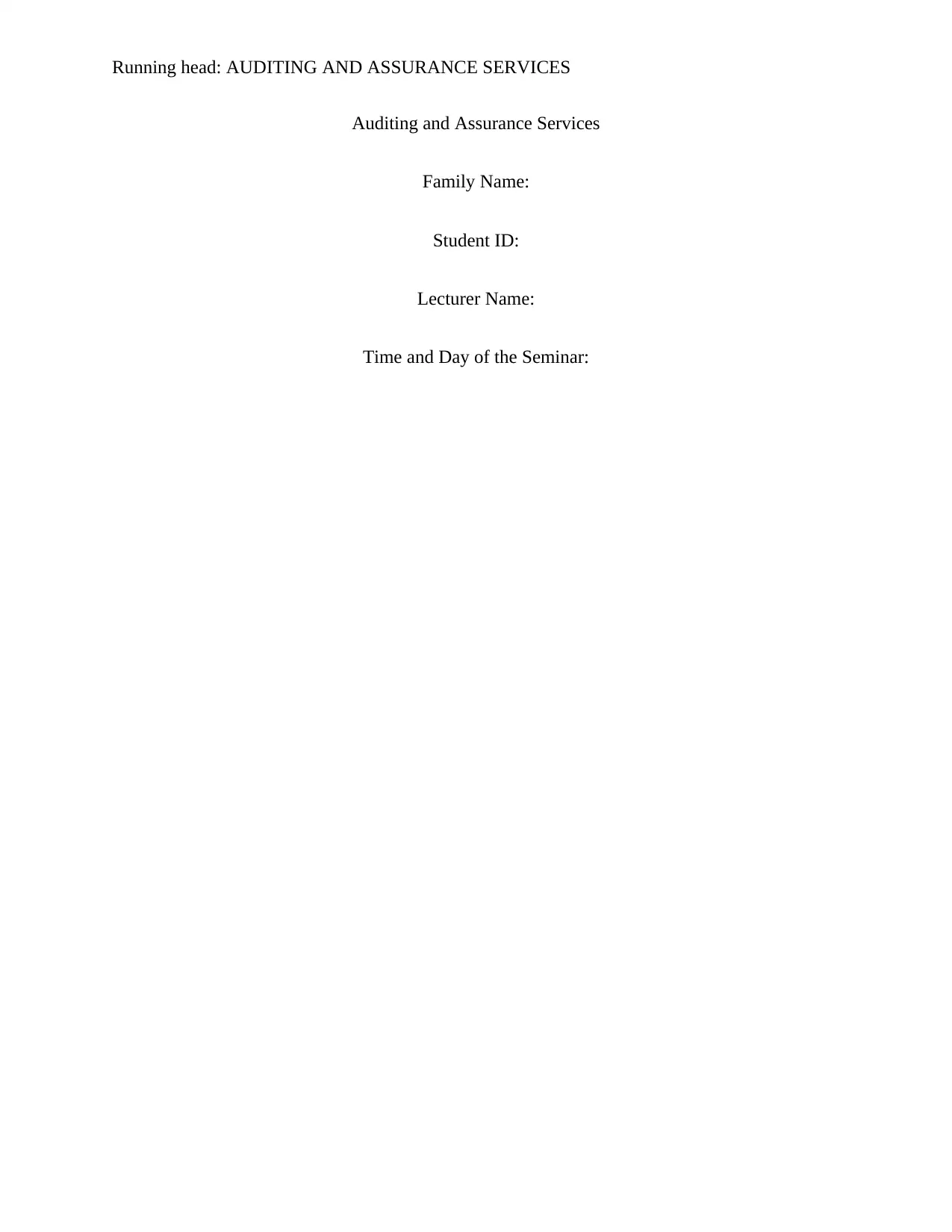
Running head: AUDITING AND ASSURANCE SERVICES
Auditing and Assurance Services
Family Name:
Student ID:
Lecturer Name:
Time and Day of the Seminar:
Auditing and Assurance Services
Family Name:
Student ID:
Lecturer Name:
Time and Day of the Seminar:
Paraphrase This Document
Need a fresh take? Get an instant paraphrase of this document with our AI Paraphraser
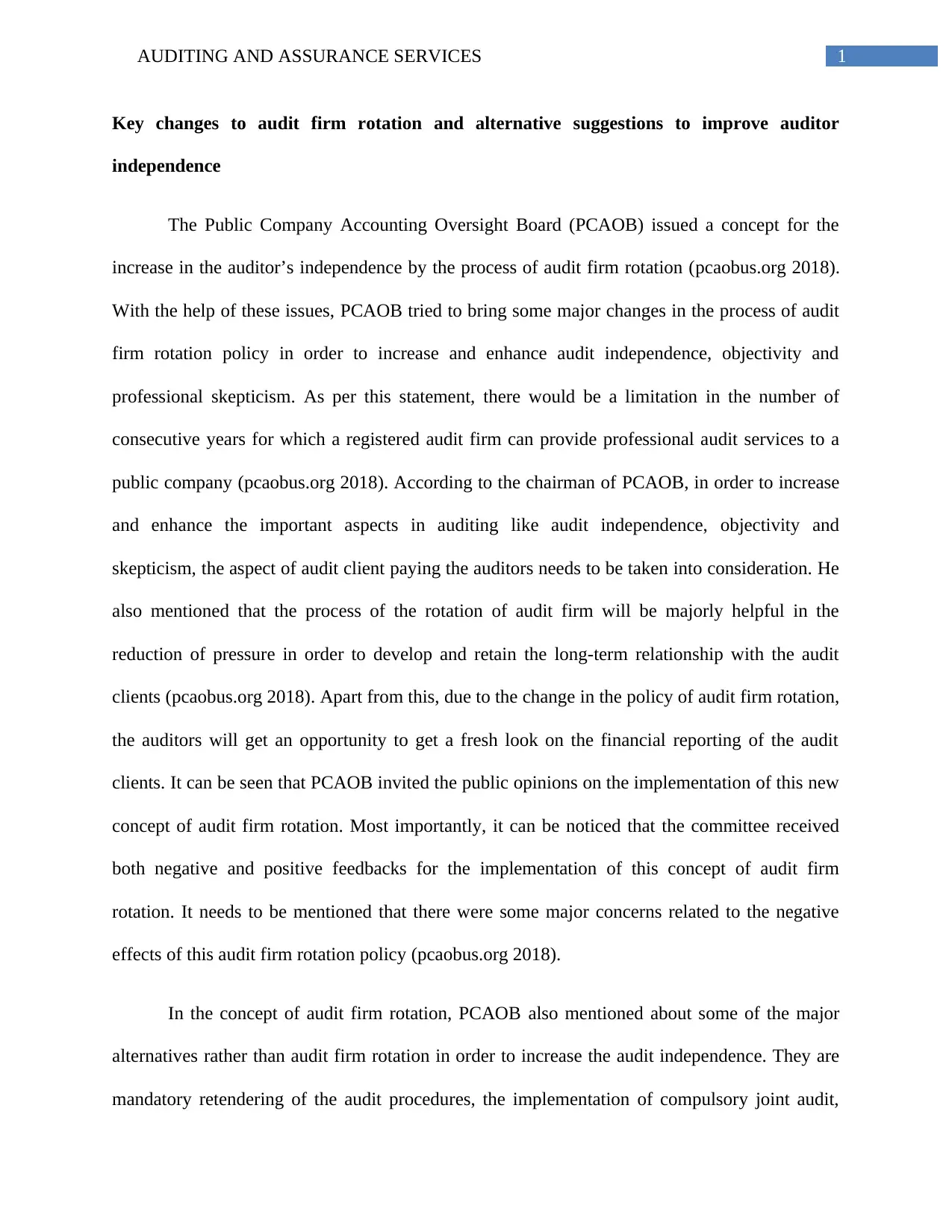
1AUDITING AND ASSURANCE SERVICES
Key changes to audit firm rotation and alternative suggestions to improve auditor
independence
The Public Company Accounting Oversight Board (PCAOB) issued a concept for the
increase in the auditor’s independence by the process of audit firm rotation (pcaobus.org 2018).
With the help of these issues, PCAOB tried to bring some major changes in the process of audit
firm rotation policy in order to increase and enhance audit independence, objectivity and
professional skepticism. As per this statement, there would be a limitation in the number of
consecutive years for which a registered audit firm can provide professional audit services to a
public company (pcaobus.org 2018). According to the chairman of PCAOB, in order to increase
and enhance the important aspects in auditing like audit independence, objectivity and
skepticism, the aspect of audit client paying the auditors needs to be taken into consideration. He
also mentioned that the process of the rotation of audit firm will be majorly helpful in the
reduction of pressure in order to develop and retain the long-term relationship with the audit
clients (pcaobus.org 2018). Apart from this, due to the change in the policy of audit firm rotation,
the auditors will get an opportunity to get a fresh look on the financial reporting of the audit
clients. It can be seen that PCAOB invited the public opinions on the implementation of this new
concept of audit firm rotation. Most importantly, it can be noticed that the committee received
both negative and positive feedbacks for the implementation of this concept of audit firm
rotation. It needs to be mentioned that there were some major concerns related to the negative
effects of this audit firm rotation policy (pcaobus.org 2018).
In the concept of audit firm rotation, PCAOB also mentioned about some of the major
alternatives rather than audit firm rotation in order to increase the audit independence. They are
mandatory retendering of the audit procedures, the implementation of compulsory joint audit,
Key changes to audit firm rotation and alternative suggestions to improve auditor
independence
The Public Company Accounting Oversight Board (PCAOB) issued a concept for the
increase in the auditor’s independence by the process of audit firm rotation (pcaobus.org 2018).
With the help of these issues, PCAOB tried to bring some major changes in the process of audit
firm rotation policy in order to increase and enhance audit independence, objectivity and
professional skepticism. As per this statement, there would be a limitation in the number of
consecutive years for which a registered audit firm can provide professional audit services to a
public company (pcaobus.org 2018). According to the chairman of PCAOB, in order to increase
and enhance the important aspects in auditing like audit independence, objectivity and
skepticism, the aspect of audit client paying the auditors needs to be taken into consideration. He
also mentioned that the process of the rotation of audit firm will be majorly helpful in the
reduction of pressure in order to develop and retain the long-term relationship with the audit
clients (pcaobus.org 2018). Apart from this, due to the change in the policy of audit firm rotation,
the auditors will get an opportunity to get a fresh look on the financial reporting of the audit
clients. It can be seen that PCAOB invited the public opinions on the implementation of this new
concept of audit firm rotation. Most importantly, it can be noticed that the committee received
both negative and positive feedbacks for the implementation of this concept of audit firm
rotation. It needs to be mentioned that there were some major concerns related to the negative
effects of this audit firm rotation policy (pcaobus.org 2018).
In the concept of audit firm rotation, PCAOB also mentioned about some of the major
alternatives rather than audit firm rotation in order to increase the audit independence. They are
mandatory retendering of the audit procedures, the implementation of compulsory joint audit,
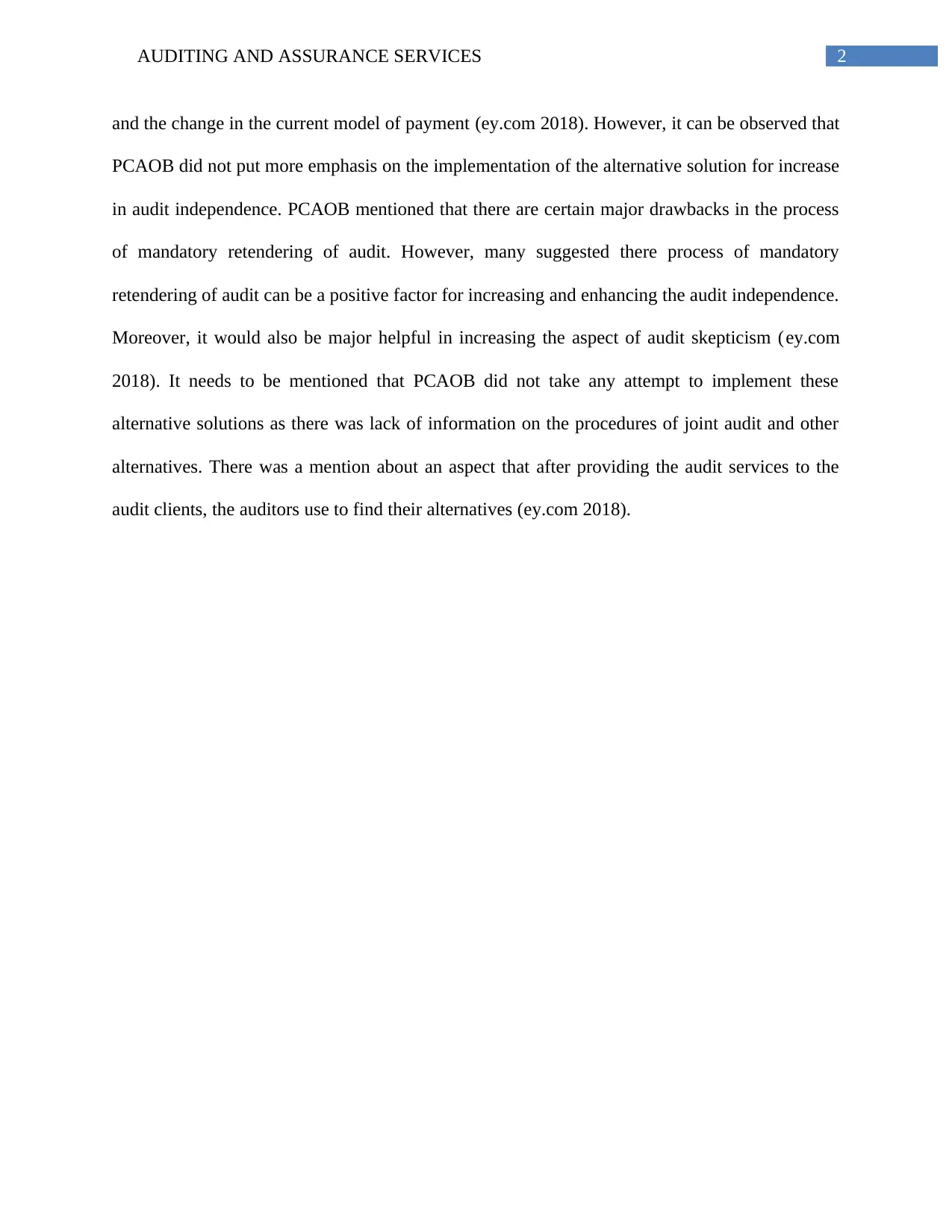
2AUDITING AND ASSURANCE SERVICES
and the change in the current model of payment (ey.com 2018). However, it can be observed that
PCAOB did not put more emphasis on the implementation of the alternative solution for increase
in audit independence. PCAOB mentioned that there are certain major drawbacks in the process
of mandatory retendering of audit. However, many suggested there process of mandatory
retendering of audit can be a positive factor for increasing and enhancing the audit independence.
Moreover, it would also be major helpful in increasing the aspect of audit skepticism (ey.com
2018). It needs to be mentioned that PCAOB did not take any attempt to implement these
alternative solutions as there was lack of information on the procedures of joint audit and other
alternatives. There was a mention about an aspect that after providing the audit services to the
audit clients, the auditors use to find their alternatives (ey.com 2018).
and the change in the current model of payment (ey.com 2018). However, it can be observed that
PCAOB did not put more emphasis on the implementation of the alternative solution for increase
in audit independence. PCAOB mentioned that there are certain major drawbacks in the process
of mandatory retendering of audit. However, many suggested there process of mandatory
retendering of audit can be a positive factor for increasing and enhancing the audit independence.
Moreover, it would also be major helpful in increasing the aspect of audit skepticism (ey.com
2018). It needs to be mentioned that PCAOB did not take any attempt to implement these
alternative solutions as there was lack of information on the procedures of joint audit and other
alternatives. There was a mention about an aspect that after providing the audit services to the
audit clients, the auditors use to find their alternatives (ey.com 2018).
⊘ This is a preview!⊘
Do you want full access?
Subscribe today to unlock all pages.

Trusted by 1+ million students worldwide
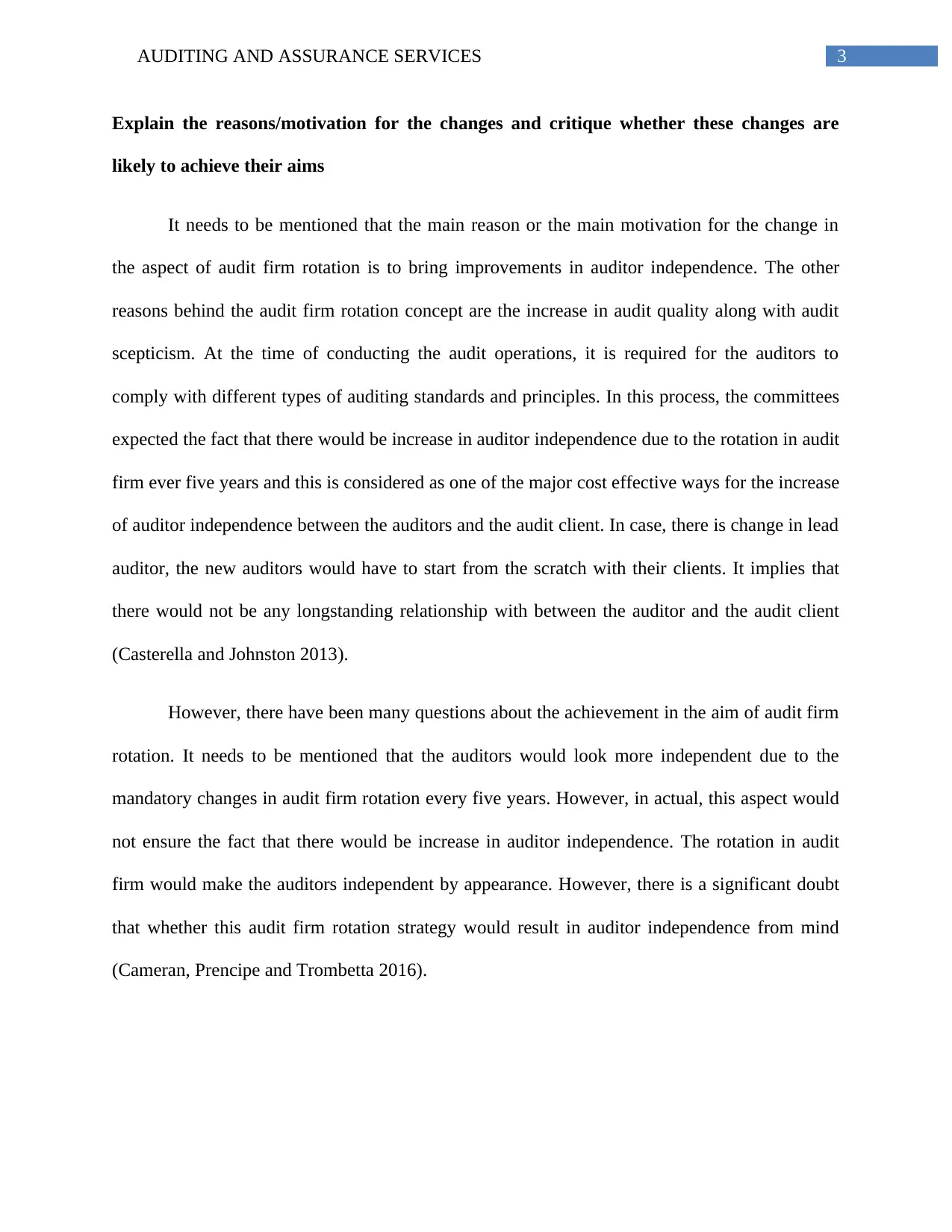
3AUDITING AND ASSURANCE SERVICES
Explain the reasons/motivation for the changes and critique whether these changes are
likely to achieve their aims
It needs to be mentioned that the main reason or the main motivation for the change in
the aspect of audit firm rotation is to bring improvements in auditor independence. The other
reasons behind the audit firm rotation concept are the increase in audit quality along with audit
scepticism. At the time of conducting the audit operations, it is required for the auditors to
comply with different types of auditing standards and principles. In this process, the committees
expected the fact that there would be increase in auditor independence due to the rotation in audit
firm ever five years and this is considered as one of the major cost effective ways for the increase
of auditor independence between the auditors and the audit client. In case, there is change in lead
auditor, the new auditors would have to start from the scratch with their clients. It implies that
there would not be any longstanding relationship with between the auditor and the audit client
(Casterella and Johnston 2013).
However, there have been many questions about the achievement in the aim of audit firm
rotation. It needs to be mentioned that the auditors would look more independent due to the
mandatory changes in audit firm rotation every five years. However, in actual, this aspect would
not ensure the fact that there would be increase in auditor independence. The rotation in audit
firm would make the auditors independent by appearance. However, there is a significant doubt
that whether this audit firm rotation strategy would result in auditor independence from mind
(Cameran, Prencipe and Trombetta 2016).
Explain the reasons/motivation for the changes and critique whether these changes are
likely to achieve their aims
It needs to be mentioned that the main reason or the main motivation for the change in
the aspect of audit firm rotation is to bring improvements in auditor independence. The other
reasons behind the audit firm rotation concept are the increase in audit quality along with audit
scepticism. At the time of conducting the audit operations, it is required for the auditors to
comply with different types of auditing standards and principles. In this process, the committees
expected the fact that there would be increase in auditor independence due to the rotation in audit
firm ever five years and this is considered as one of the major cost effective ways for the increase
of auditor independence between the auditors and the audit client. In case, there is change in lead
auditor, the new auditors would have to start from the scratch with their clients. It implies that
there would not be any longstanding relationship with between the auditor and the audit client
(Casterella and Johnston 2013).
However, there have been many questions about the achievement in the aim of audit firm
rotation. It needs to be mentioned that the auditors would look more independent due to the
mandatory changes in audit firm rotation every five years. However, in actual, this aspect would
not ensure the fact that there would be increase in auditor independence. The rotation in audit
firm would make the auditors independent by appearance. However, there is a significant doubt
that whether this audit firm rotation strategy would result in auditor independence from mind
(Cameran, Prencipe and Trombetta 2016).
Paraphrase This Document
Need a fresh take? Get an instant paraphrase of this document with our AI Paraphraser
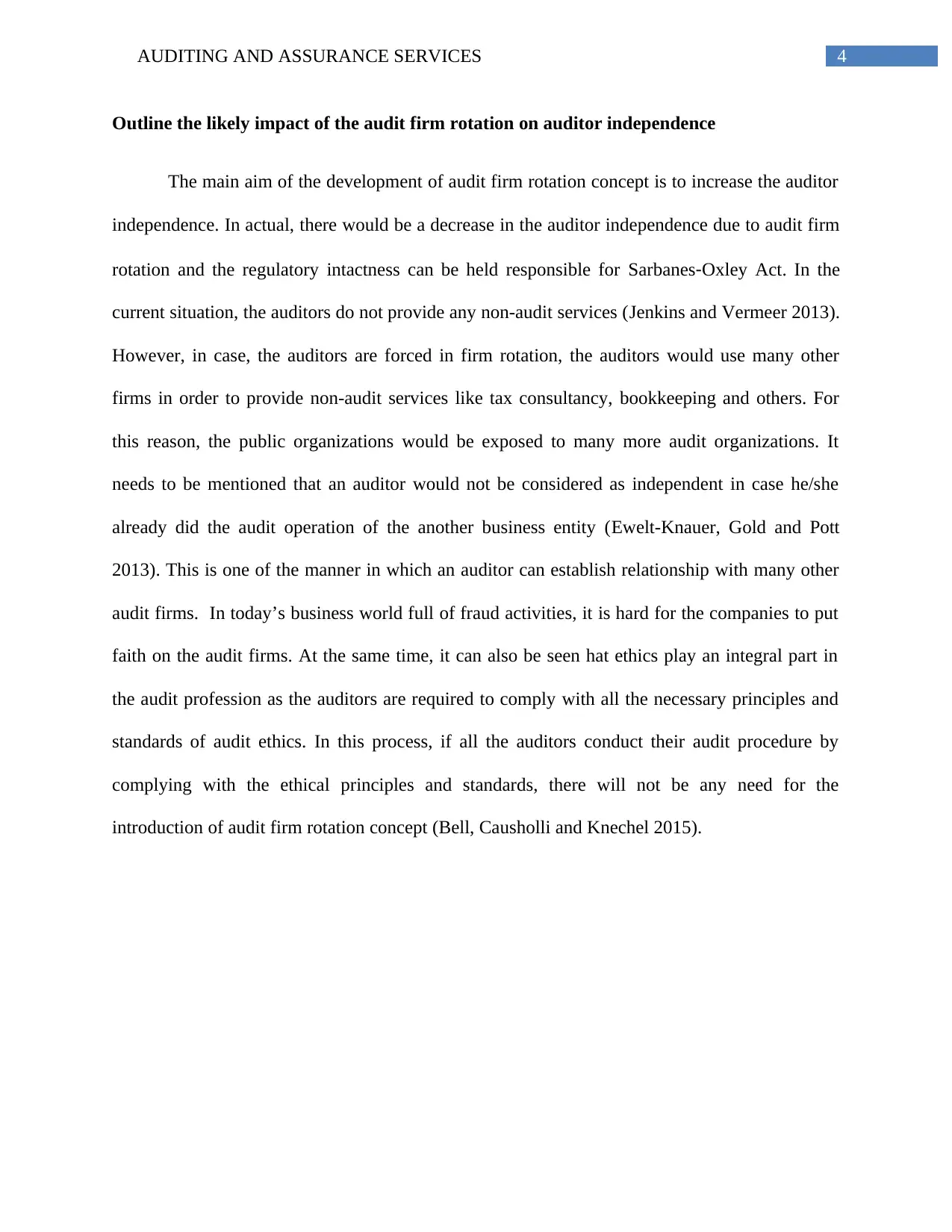
4AUDITING AND ASSURANCE SERVICES
Outline the likely impact of the audit firm rotation on auditor independence
The main aim of the development of audit firm rotation concept is to increase the auditor
independence. In actual, there would be a decrease in the auditor independence due to audit firm
rotation and the regulatory intactness can be held responsible for Sarbanes‐Oxley Act. In the
current situation, the auditors do not provide any non-audit services (Jenkins and Vermeer 2013).
However, in case, the auditors are forced in firm rotation, the auditors would use many other
firms in order to provide non-audit services like tax consultancy, bookkeeping and others. For
this reason, the public organizations would be exposed to many more audit organizations. It
needs to be mentioned that an auditor would not be considered as independent in case he/she
already did the audit operation of the another business entity (Ewelt-Knauer, Gold and Pott
2013). This is one of the manner in which an auditor can establish relationship with many other
audit firms. In today’s business world full of fraud activities, it is hard for the companies to put
faith on the audit firms. At the same time, it can also be seen hat ethics play an integral part in
the audit profession as the auditors are required to comply with all the necessary principles and
standards of audit ethics. In this process, if all the auditors conduct their audit procedure by
complying with the ethical principles and standards, there will not be any need for the
introduction of audit firm rotation concept (Bell, Causholli and Knechel 2015).
Outline the likely impact of the audit firm rotation on auditor independence
The main aim of the development of audit firm rotation concept is to increase the auditor
independence. In actual, there would be a decrease in the auditor independence due to audit firm
rotation and the regulatory intactness can be held responsible for Sarbanes‐Oxley Act. In the
current situation, the auditors do not provide any non-audit services (Jenkins and Vermeer 2013).
However, in case, the auditors are forced in firm rotation, the auditors would use many other
firms in order to provide non-audit services like tax consultancy, bookkeeping and others. For
this reason, the public organizations would be exposed to many more audit organizations. It
needs to be mentioned that an auditor would not be considered as independent in case he/she
already did the audit operation of the another business entity (Ewelt-Knauer, Gold and Pott
2013). This is one of the manner in which an auditor can establish relationship with many other
audit firms. In today’s business world full of fraud activities, it is hard for the companies to put
faith on the audit firms. At the same time, it can also be seen hat ethics play an integral part in
the audit profession as the auditors are required to comply with all the necessary principles and
standards of audit ethics. In this process, if all the auditors conduct their audit procedure by
complying with the ethical principles and standards, there will not be any need for the
introduction of audit firm rotation concept (Bell, Causholli and Knechel 2015).
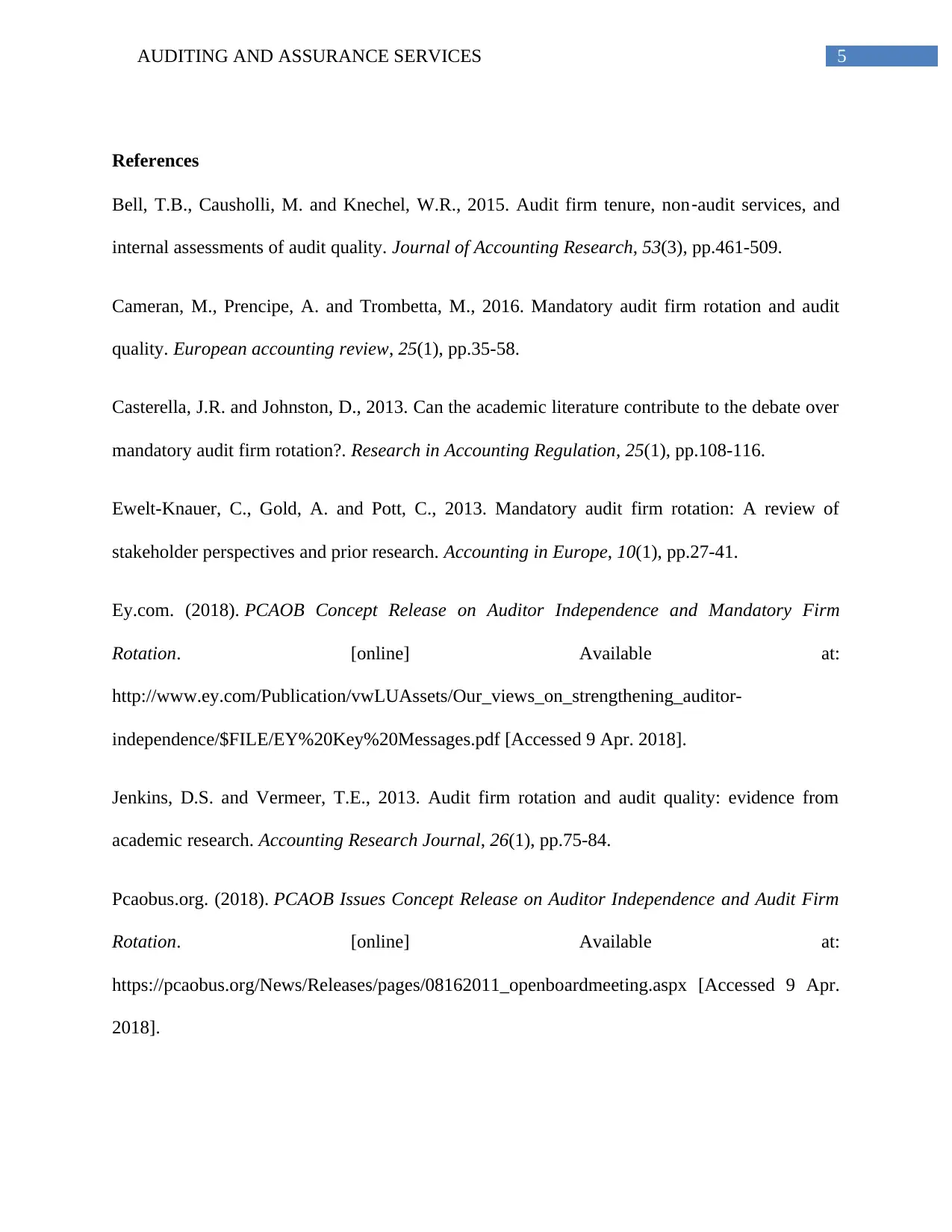
5AUDITING AND ASSURANCE SERVICES
References
Bell, T.B., Causholli, M. and Knechel, W.R., 2015. Audit firm tenure, non‐audit services, and
internal assessments of audit quality. Journal of Accounting Research, 53(3), pp.461-509.
Cameran, M., Prencipe, A. and Trombetta, M., 2016. Mandatory audit firm rotation and audit
quality. European accounting review, 25(1), pp.35-58.
Casterella, J.R. and Johnston, D., 2013. Can the academic literature contribute to the debate over
mandatory audit firm rotation?. Research in Accounting Regulation, 25(1), pp.108-116.
Ewelt-Knauer, C., Gold, A. and Pott, C., 2013. Mandatory audit firm rotation: A review of
stakeholder perspectives and prior research. Accounting in Europe, 10(1), pp.27-41.
Ey.com. (2018). PCAOB Concept Release on Auditor Independence and Mandatory Firm
Rotation. [online] Available at:
http://www.ey.com/Publication/vwLUAssets/Our_views_on_strengthening_auditor-
independence/$FILE/EY%20Key%20Messages.pdf [Accessed 9 Apr. 2018].
Jenkins, D.S. and Vermeer, T.E., 2013. Audit firm rotation and audit quality: evidence from
academic research. Accounting Research Journal, 26(1), pp.75-84.
Pcaobus.org. (2018). PCAOB Issues Concept Release on Auditor Independence and Audit Firm
Rotation. [online] Available at:
https://pcaobus.org/News/Releases/pages/08162011_openboardmeeting.aspx [Accessed 9 Apr.
2018].
References
Bell, T.B., Causholli, M. and Knechel, W.R., 2015. Audit firm tenure, non‐audit services, and
internal assessments of audit quality. Journal of Accounting Research, 53(3), pp.461-509.
Cameran, M., Prencipe, A. and Trombetta, M., 2016. Mandatory audit firm rotation and audit
quality. European accounting review, 25(1), pp.35-58.
Casterella, J.R. and Johnston, D., 2013. Can the academic literature contribute to the debate over
mandatory audit firm rotation?. Research in Accounting Regulation, 25(1), pp.108-116.
Ewelt-Knauer, C., Gold, A. and Pott, C., 2013. Mandatory audit firm rotation: A review of
stakeholder perspectives and prior research. Accounting in Europe, 10(1), pp.27-41.
Ey.com. (2018). PCAOB Concept Release on Auditor Independence and Mandatory Firm
Rotation. [online] Available at:
http://www.ey.com/Publication/vwLUAssets/Our_views_on_strengthening_auditor-
independence/$FILE/EY%20Key%20Messages.pdf [Accessed 9 Apr. 2018].
Jenkins, D.S. and Vermeer, T.E., 2013. Audit firm rotation and audit quality: evidence from
academic research. Accounting Research Journal, 26(1), pp.75-84.
Pcaobus.org. (2018). PCAOB Issues Concept Release on Auditor Independence and Audit Firm
Rotation. [online] Available at:
https://pcaobus.org/News/Releases/pages/08162011_openboardmeeting.aspx [Accessed 9 Apr.
2018].
⊘ This is a preview!⊘
Do you want full access?
Subscribe today to unlock all pages.

Trusted by 1+ million students worldwide
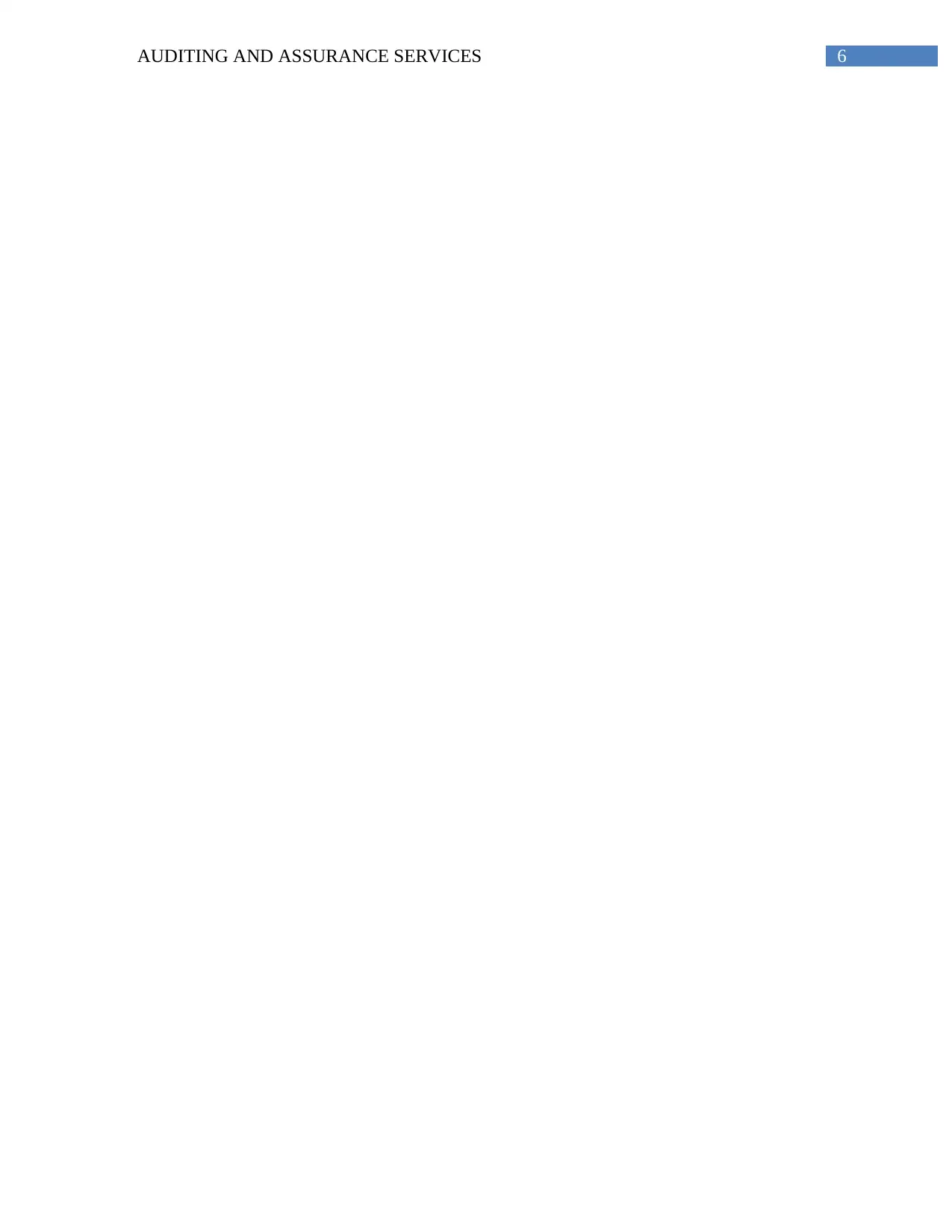
6AUDITING AND ASSURANCE SERVICES
1 out of 7
Related Documents
Your All-in-One AI-Powered Toolkit for Academic Success.
+13062052269
info@desklib.com
Available 24*7 on WhatsApp / Email
![[object Object]](/_next/static/media/star-bottom.7253800d.svg)
Unlock your academic potential
Copyright © 2020–2026 A2Z Services. All Rights Reserved. Developed and managed by ZUCOL.





